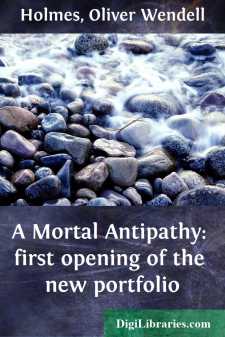Literary Collections
- American 84
- Ancient, Classical & Medieval 14
- Asian 1
- Australian & Oceanian 1
- Canadian 55
- Continental European 121
- English, Irish, Scottish, Welsh 179
- Essays 160
- General 24
- Letters 46
- Middle Eastern 1
Literary Collections Books
Sort by:
by:
Harold Bindloss
PROLOGUE Fairmead, Western Canada. It is a still, hot day in autumn, and there is a droning of mosquitoes where I sit by an open window, glancing alternately out across the Assiniboian prairie and somewhat blankly at the bundle of paper before me, ready to begin this story. Its telling will not be an easy matter, but one finds idle hours pass heavily after a life such as mine has been, and since the...
more...
by:
Edmund Gosse
PREFACE: ON FLUCTUATIONS OF TASTE When Voltaire sat down to write a book on Epic Poetry, he dedicated his first chapter to "Differences of Taste in Nations." A critic of to-day might well find it necessary, on the threshold of a general inquiry, to expatiate on "Differences of Taste in Generations." Changes of standard in the arts are always taking place, but it is only with advancing...
more...
by:
Jeremiah Curtin
Introduction Eliza Orzeszko, the authoress of "The Argonauts," is the greatest female writer and thinker in the Slav world at present. There are keen and good critics, just judges of thought and style, who pronounce her the first literary artist among the women of Europe. These critics are not Western Europeans, for Western Europe has no means yet of appreciating this gifted woman. No doubt it...
more...
INTRODUCTION. "And why the New Portfolio, I would ask?" Pray, do you remember, when there was an accession to the nursery in which you have a special interest, whether the new-comer was commonly spoken of as a baby? Was it not, on the contrary, invariably, under all conditions, in all companies, by the whole household, spoken of as the baby? And was the small receptacle provided for it commonly...
more...
by:
James De Mille
CHAPTER I. CONSISTING MERELY OF INTRODUCTORY MATTER. This is a story of Quebec. Quebec is a wonderful city. I am given to understand that the ridge on which the city is built is Laurentian; and the river that flows past it is the same. On this (not the river, you know) are strata of schist, shale, old red sand-stone, trap, granite, clay, and mud. The upper stratum is ligneous, and is found to be very...
more...
Perhaps the reader may not feel in these papers that inner solidarity which the writer is conscious of; and it is in this doubt that the writer wishes to offer a word of explanation. He owns, as he must, that they have every appearance of a group of desultory sketches and essays, without palpable relation to one another, or superficial allegiance to any central motive. Yet he ventures to hope that the...
more...
by:
Honore de Balzac
CHAPTER I. SERAPHITUS As the eye glances over a map of the coasts of Norway, can the imagination fail to marvel at their fantastic indentations and serrated edges, like a granite lace, against which the surges of the North Sea roar incessantly? Who has not dreamed of the majestic sights to be seen on those beachless shores, of that multitude of creeks and inlets and little bays, no two of them alike,...
more...
Are you of that elect who, at certain seasons of the year—perhaps in March when there is timid promise of the spring or in the days of October when there are winds across the earth and gorgeous panic of fallen leaves—are you of that elect who, on such occasion or any occasion else, feel stirrings in you to be quit of whatever prosy work is yours, to throw down your book or ledger, or your measuring...
more...
by:
Various
INTRODUCTORY. This volume speaks so well for itself that it does not need many words of preface to commend it to a wide circle of readers. Its rich and varied contents, however, become far more interesting when interpreted by the motive that won them from their authors; and when the kindly feeling that offered them so freely is known, these gifts, like the pearls of a rosary, will be prized not only...
more...
by:
Ralph Connor
CHAPTER I THE FOOTHILLS COUNTRY Beyond the great prairies and in the shadow of the Rockies lie the Foothills. For nine hundred miles the prairies spread themselves out in vast level reaches, and then begin to climb over softly rounded mounds that ever grow higher and sharper till, here and there, they break into jagged points and at last rest upon the great bases of the mighty mountains. These rounded...
more...











